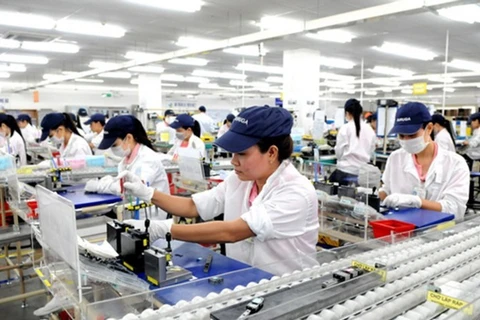 The General Statistics Office (GSO) has submitted to the Prime Minister a statistical project on how to measure the non-observed economy, including underground and illegal economic activities that affect the scale of the econom(Source: http://baocongthuong.com.vn/)
The General Statistics Office (GSO) has submitted to the Prime Minister a statistical project on how to measure the non-observed economy, including underground and illegal economic activities that affect the scale of the econom(Source: http://baocongthuong.com.vn/) Hanoi (VNA) – The General Statistics Office (GSO) has submitted to the Prime Minister a statistical project on how to measure the non-observed economy, including underground and illegal economic activities that affect the scale of the economy.
The project looks to develop a statistical methodology in line with regulations of the System of National Accounts (SNA) 2008 and based on recommendations of international organisations such as the United Nations Statistics Division (UNSD), the Organisation for Economic Cooperation and Development (OECD), and the International Labour Organisation (ILO).
In 2018, the GSO will conduct pilot evaluation of production outcomes of non-observed economic activities in Vietnam. From 2019 onwards, the GSO will integrate the results in the country’s gross domestic product (GDP) and the gross regional domestic product (GRDP) of centrally-run cities and provinces to produce more accurate economic indicators.
The non-observed economy comprises five elements.
The first element comprises underground economic activities that are legal but deliberately concealed from the public authorities to avoid payment of taxes and social security contributions; or complying with certain legal standards, such as minimum wage, maximum working hours, and safety or health standards, and with administrative procedures, such as completing statistical reports.
The second comprises illegal economic activities that generate goods and services forbidden by law, for example, drug trafficking, prostitution, and human trafficking. Legal economic activities carried out by unauthorized producers also belong to this category.
The third one is the informal sector including productive activities conducted by households with the main objective to generate employment and income for the people involved. The production is operated on a small scale, at a low level of organization and generally based on casual employment, kinship or personal and social relations, and not on contractual agreements.
The fourth element is the household production for self-consumption including productive activities that result in goods or services consumed or accumulated by the households that produced them, for instance, producing crops and livestock, weaving cloth, and building one’s own house.
The last one comprises economic activities that are missed out by data collection programmes due to problems arising either from statistical coverage or statistical errors.
According to GSO calculations, the observed activities in the informal sector contributed 14.34 percent to the national GDP in 2015, while observed household production for self-consumption contributed 2.09 percent. -VNA
VNA






















